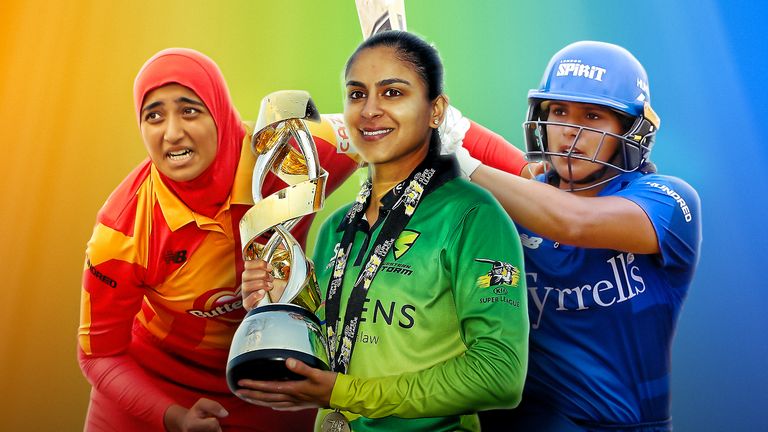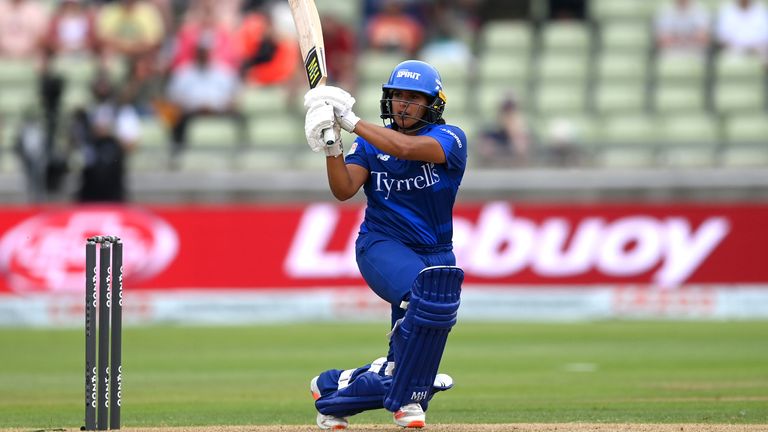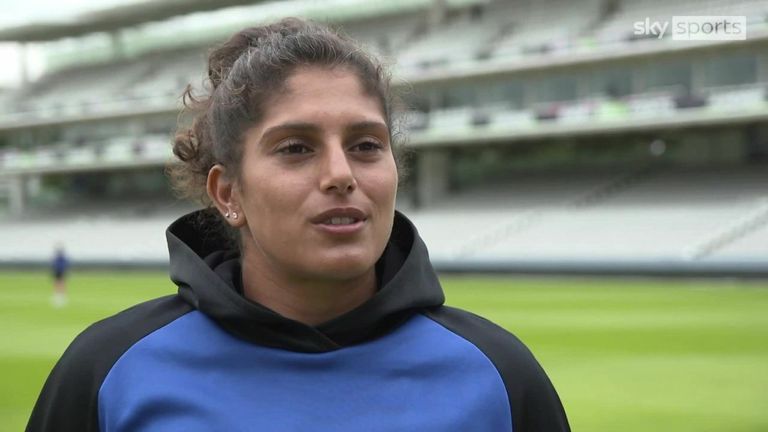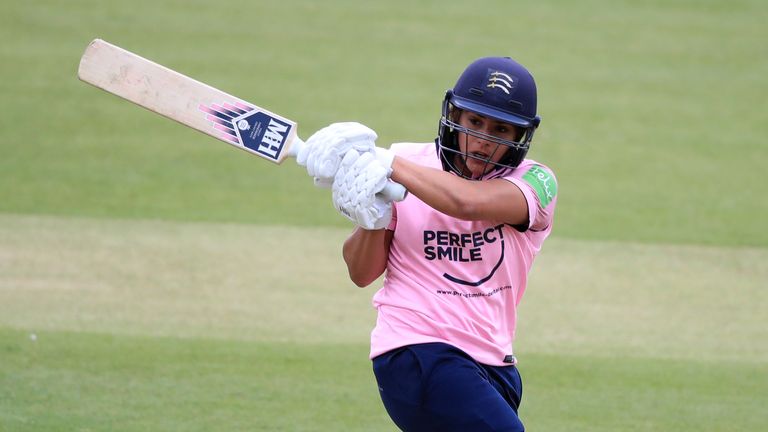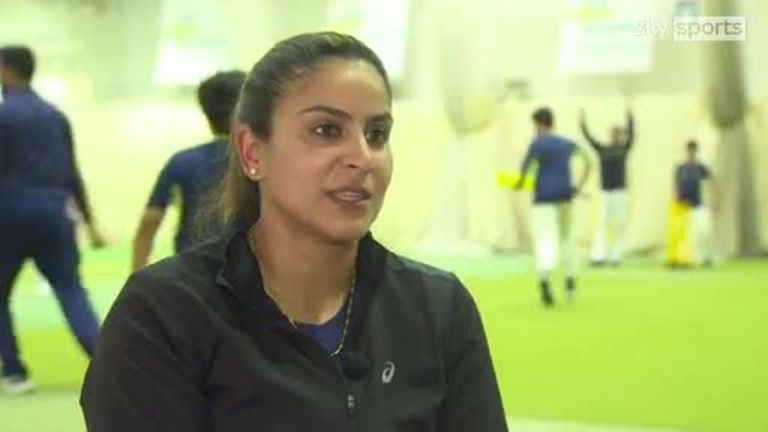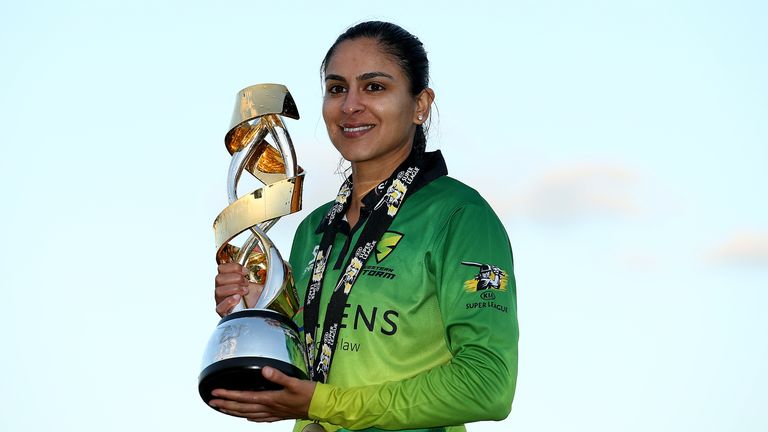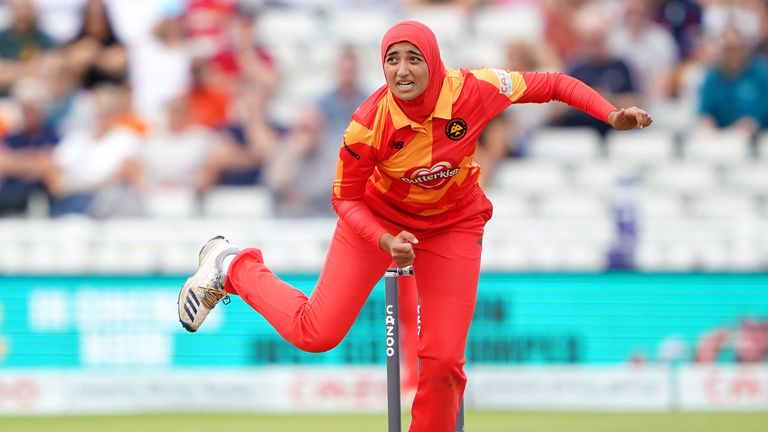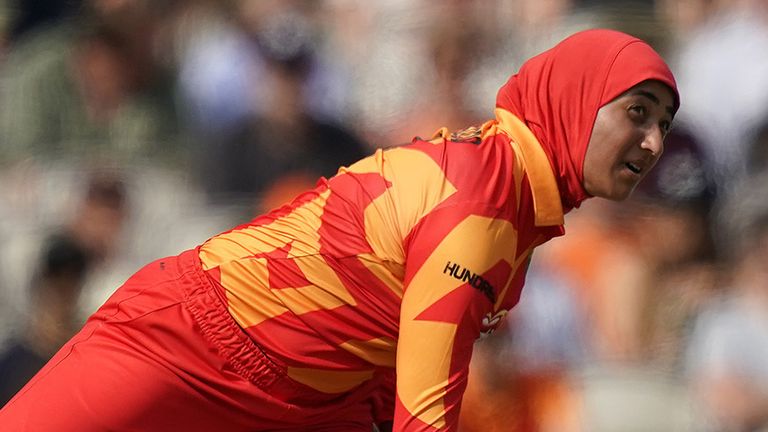South Asian Heritage Month: Naomi Dattani, Sonia Odedra and Abtaha Maqsood on cricket, culture and being role models
As part of South Asian Heritage Month three cricketers playing in The Hundred speak to Sky Sports News about their background, ambitions, successes, experiences and exactly how they will be role models for the youngsters
Thursday 12 August 2021 14:35, UK
Three British South Asian female cricketers speak about the importance of their heritage, the journey to become elite players, and how they plan to make it easier for youngsters to play cricket.
Naomi Dattani, Sonia Odedra and Abtaha Maqsood are the only South Asian women with professional contracts who play elite cricket.
All three are playing in The Hundred and spoke to Sky Sports News during South Asian Heritage Month…
Naomi Dattani: British Indian, Middlesex captain and sports and exercise graduate
Dattani grew up in Ealing in west London and went to Greenford High School - the same school which Paul Merson and Bukayo Saka attended.
She also graduated from Loughborough University with a degree in sports and exercise as she rose through the ranks at Middlesex.
"I think it's been a long journey from playing in the back garden with my older brother smashing my mum's pots and plants everywhere!" she told Sky Sports News from Lord's.
Her first experience of competitive cricket came when she joined a boys' cricket team in Perivale at the age of 10. It was her first experience playing with pads and a real cricket ball.,
She was only 14 when she made her Middlesex first-team debut in 2008. That journey has led to her becoming captain of Middlesex Women in all formats.
Her parents understood the significance when they asked if she was her team's first Asian county captain. She also plays for Sunrisers and signed for London Spirit for this summer's new 100-ball tournament, The Hundred.
The Middlesex website describes her as a "hard hitting, left-handed opener" who has a "clean-ball striking and energetic style". Dattani is an all-rounder who also bowls left-arm fast-medium.
As a teenager she had to balance family commitments with her love for cricket. Coming from a large family and being close to many relatives she was expected to attend family weddings and cultural events at weekends. But it meant she missed out on playing and improving with bat and ball.
Dattani said: "To be a woman playing sport is already one barrier. But to be an Asian woman playing sport is a bigger barrier. And you always have to fight against the boys to make your voice heard.
"As I grew up through my 20s the questions around 'when are you getting married?' start coming in, and constantly trying to persuade or challenge those comments became quite tiring.
"But it spurs me on to keep going to know that I'm trying to pave the way for a young Asian girl so they don't have to face that and they can go through that pathway a lot easier."
Dattani, a British Indian, was one of 41 women to receive regional domestic contracts which helps her to commit to the sport full-time. Before that she found it hard to reach her full potential. She was working part-time and then focusing on cricket the rest of the week while other professionals were already playing full-time.
"It's really cool to kind of concentrate on cricket and not have a job or studies alongside it. It's really exciting to stand here now and give 100 per cent to this job," the 27-year-old said.
"And knowing now that the women's game is professional from an earlier age is only going to help the system, help the younger girls know that they can be a professional without going all the way to international level."
Isa Guha was the last player to feature regularly for England from a South Asian background, but last played international cricket a decade ago.
Dattani says it is "crazy" that only a couple of other female cricketers who have a similar heritage are playing at elite level in the UK.
"To have so many British Asians that actually love the sport, it's crazy to think that the numbers are so small at the moment, but I'd love for that to change because there are so many talented young boys and girls out there who should be wanting to take up the sport and play professionally," she said.
For Dattani, finding more young talent also depends on parents understanding more about the possibilities a career in cricket brings.
She said: "I think the moment you can involve the parents ... they come from a generation where their parents were probably more strict than what they are.
"I think the more we can educate the parents today about sport and fitness and that this is how you get to being a professional athlete, the better it's going to become."
'I'm proud of who I am and have embraced my culture'
Dattani says when she was growing up and improving as a cricketer she tried to fit in with team-mates rather than show her diversity. She is Hindu and is part of a Gujarati family.
"I didn't really embrace my culture at that time. I just kind of wanted to fit in with everyone and not really make a big deal about it. But the older I've got, I've realised ... embrace my culture. I'm proud of who I am," she said.
"I wear a necklace with a Ganesh (the Hindu God known for removing obstacles) that I hold on to every time I play a match. And I'm proud to come from where I come from.
"And I think that's what I want to see people just doing, embracing their culture from a young age and not being shy to show it in front of others when they feel like they might be the minority."
Sonia Odedra: British Indian, England international and coach
British Indian Sonia Odedra, who is 33 and was born in west London, also has a Gujarati heritage. Her mother was raised in Uganda while her father was born in India.
Odedra also grew up playing cricket in the back garden with her brother. "My dad was a massive cricket fan and he wanted my brother to become a cricketer actually, so all the focus was on him," she said.
"So I just used to play in the garden with him just casually. And the first game I actually played was at primary school. I got into the boys team there and we went on to become school champions."
But she says there were barriers from the age of 11 because of her gender which stopped her development.
"I remember after that when I went to secondary school, there was no opportunity for girls to play cricket. It was just boys only. So it kind of stopped there," said Odedra.
"It was quite frustrating because I said, 'can I join the team?' They said 'no it's boys only' and there was no guidance at that time as well for them to go and say 'OK why don't you go away and play for this girls team?'.
"So it was just a dead-end almost. I think the education wasn't there for the schools to know what to do. I think that has improved now. Women's cricket is on the rise and those opportunities are there now."
Odedra is an all-rounder and signed to play in The Hundred when confirming earlier this year she will play for Southern Brave. Her team includes international players like Sophia Dunkley and Indian legend Smriti Mandhana.
Odedra recalls the moment she decided to pursue a cricket career.
"At the age of 20, that's when I decided that I want to play cricket professionally. It was just after I finished my studies and I just thought that this is what I want to do," the right-arm seam bowler said.
"And my journey started here at the City Cricket Academy (in Leicester). There was a little job advert here and I thought I'd do a part-time job and at the same time train and achieve the goal to play for England."
Her only appearance for England came in 2014 when she made her international debut against India. She was in squads for the shorter format but was not picked to play.
In 2019 she was part of the Western Storm team that won the final edition of the Super League. And in May she captained Notts Women as they won the East Midlands T20 title and finished the season unbeaten.
Odedra is not waiting until the end of her playing career to inspire young South Asians. She works as operations manager with her husband at the same academy where children and adults of all levels can experience the sport and improve their skills.
Many young South Asians from the local area just use the facilities for fun and recreation while others are focused on playing at the elite level. Former India captain Sachin Tendulkar's son spent three weeks at the academy.
Odedra has been helping to coach there for over a decade and helps to inspire many young girls with a similar heritage. She also says playing a team sport like cricket can boost the confidence of children in their day-to-day lives.
Many families are more comfortable letting their children take part after speaking to her. Odedra feels educating parents will be key to transforming perceptions about women's cricket.
"I think that education is required for the parents and I still feel that they don't know that women's cricket is now professional," she says.
"Women get paid to play cricket now, it's not just a sport you just play. And a lot of parents don't know that.
"And they can encourage the girls to now take it as a career path instead of stereotype - 'oh you must become a doctor or engineer', or whatever it is.
"That opportunity of sport is there and in cricket women are now getting paid which is a big thing."
Abtaha Maqsood: British Muslim, Birmingham Phoenix bowler and dentistry student
Abtaha Maqsood, 22, is Britain's first hijab-wearing cricketer to play international cricket. She was born in Glasgow where she studies dentistry and her parents were born in Pakistan.
The leg-spinner made her T20I debut for Scotland when she was 19 and is currently playing for Birmingham Phoenix in The Hundred.
"When I was a young kid and I first started wearing the hijab and started playing cricket, it was tough for me back then," she told Sky Sports News.
"And now that I'm on this big stage and I feel so comfortable with myself, it just feels amazing to me. And I know that if I can feel that comfortable then anyone can. I do reflect and I do look back and see how far I've come."
She describes the positive change she has experienced while playing for her country.
"At first there wasn't as much knowledge about Islam and about Muslims and what we eat and what we wear and stuff like that. But my team-mates have learned a lot.
"Cricket Scotland has learned a lot and now things like halal food, and wearing long-sleeved shirts and stuff like that, not wearing shorts, all that sort of thing is just like second nature to them.
"And they just kind of know now not to give me non-halal food and always to make sure that there is food available for me. We've come really far. When I first started that was not there at all. But now it's everywhere.
"Now I've come here (Birmingham Phoenix) I've only really had halal food, it's been great here in Birmingham. The set-up is so much better now for South Asians. It's just people are now aware of the stuff that we eat and the stuff that we wear."
Maqsood joined her local cricket club, Poloc, at the age of 11. She had only played club cricket for four months before she was called up to train with the Scotland Women's U17s team. She made her debut against Ireland at the age of 12 for the U17s when she bowled in the T20 match and also took her first international wicket.
Maqsood says she never really had a cricket role model who looked like her. Now she wants to be seen by young Muslims as the role model she never had.
"I think representation matters so much. When I was growing up I never really had a role model to look up to who looked exactly like me; I really hope to be that person for a lot of people and I really hope that The Hundred shows me in that light and people are hopefully able to be inspired by that."
She recently told Sky Sports about overcoming her fear of not belonging this summer. "I've never really felt like I belong on the big stage and now that I'm here at The Hundred I feel so much more at ease and I feel like I do belong. The team have been amazing, they've been really welcoming."
'The Hundred is bringing families together'
Dattani says The Hundred tournament has been "amazing" and showcased women's cricket to a new audience.
"I think it's already brought so many families together, so many more young kids to the ground, and it's only just elevating women's cricket on a really big stage," the London Spirit player said.
"And highlighting so many important characters that are playing on the pitch about what you can achieve and just showing the diversity already on the pitch.
"So that's only going to make a young girl want to take up the sport and know that could be them one day."
The England and Wales Cricket Board launched the South Asian Action Plan in 2018 aiming to build better relationships with communities and engage with them at all abilities.
Part of the ongoing work is the high-profile Dream Big Desi Women project which is recruiting hundreds of British South Asian women. They are trained as volunteers that can then deliver cricket programmes in their communities.
Initiatives like this help the ECB take cricket to more non-traditional areas like community centres or temples which have traditionally been hard to reach.
The different journeys into professional cricket by Dattani, Odedra and Maqsood have not been without challenges. But now as one of the few females with a South Asian heritage, they plan to be trailblazers for the next generation.
Watch The Hundred live on Sky Sports between now and August 21.
